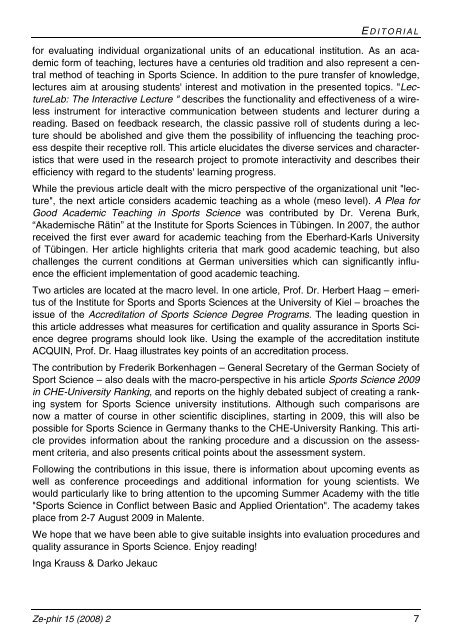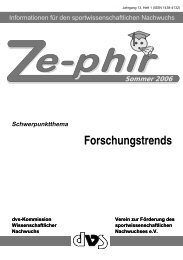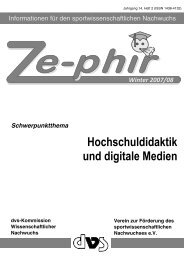Download (PDF) - Sportwissenschaftlicher Nachwuchs
Download (PDF) - Sportwissenschaftlicher Nachwuchs
Download (PDF) - Sportwissenschaftlicher Nachwuchs
Sie wollen auch ein ePaper? Erhöhen Sie die Reichweite Ihrer Titel.
YUMPU macht aus Druck-PDFs automatisch weboptimierte ePaper, die Google liebt.
E DITORIALfor evaluating individual organizational units of an educational institution. As an academicform of teaching, lectures have a centuries old tradition and also represent a centralmethod of teaching in Sports Science. In addition to the pure transfer of knowledge,lectures aim at arousing students' interest and motivation in the presented topics. "LectureLab:The Interactive Lecture " describes the functionality and effectiveness of a wirelessinstrument for interactive communication between students and lecturer during areading. Based on feedback research, the classic passive roll of students during a lectureshould be abolished and give them the possibility of influencing the teaching processdespite their receptive roll. This article elucidates the diverse services and characteristicsthat were used in the research project to promote interactivity and describes theirefficiency with regard to the students' learning progress.While the previous article dealt with the micro perspective of the organizational unit "lecture",the next article considers academic teaching as a whole (meso level). A Plea forGood Academic Teaching in Sports Science was contributed by Dr. Verena Burk,“Akademische Rätin” at the Institute for Sports Sciences in Tübingen. In 2007, the authorreceived the first ever award for academic teaching from the Eberhard-Karls Universityof Tübingen. Her article highlights criteria that mark good academic teaching, but alsochallenges the current conditions at German universities which can significantly influencethe efficient implementation of good academic teaching.Two articles are located at the macro level. In one article, Prof. Dr. Herbert Haag – emeritusof the Institute for Sports and Sports Sciences at the University of Kiel – broaches theissue of the Accreditation of Sports Science Degree Programs. The leading question inthis article addresses what measures for certification and quality assurance in Sports Sciencedegree programs should look like. Using the example of the accreditation instituteACQUIN, Prof. Dr. Haag illustrates key points of an accreditation process.The contribution by Frederik Borkenhagen – General Secretary of the German Society ofSport Science – also deals with the macro-perspective in his article Sports Science 2009in CHE-University Ranking, and reports on the highly debated subject of creating a rankingsystem for Sports Science university institutions. Although such comparisons arenow a matter of course in other scientific disciplines, starting in 2009, this will also bepossible for Sports Science in Germany thanks to the CHE-University Ranking. This articleprovides information about the ranking procedure and a discussion on the assessmentcriteria, and also presents critical points about the assessment system.Following the contributions in this issue, there is information about upcoming events aswell as conference proceedings and additional information for young scientists. Wewould particularly like to bring attention to the upcoming Summer Academy with the title"Sports Science in Conflict between Basic and Applied Orientation". The academy takesplace from 2-7 August 2009 in Malente.We hope that we have been able to give suitable insights into evaluation procedures andquality assurance in Sports Science. Enjoy reading!Inga Krauss & Darko JekaucZe-phir 15 (2008) 2 7







